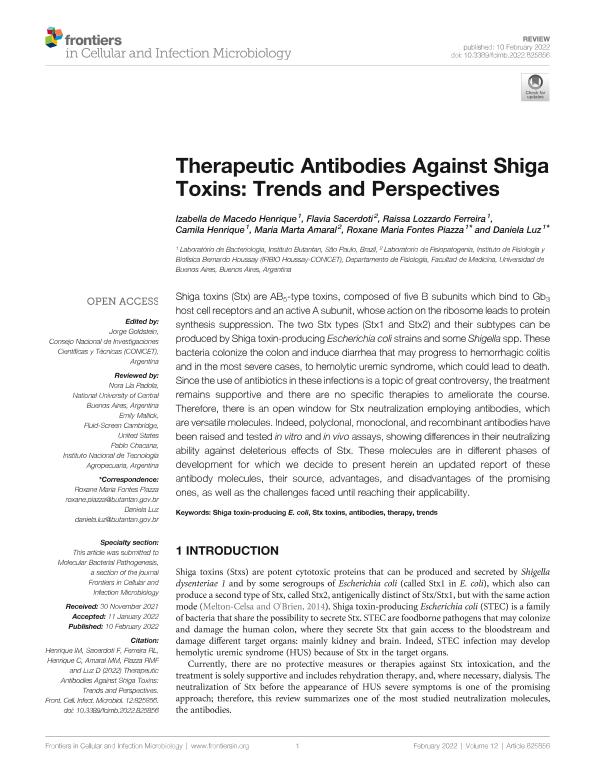Artículo
Therapeutic Antibodies Against Shiga Toxins: Trends and Perspectives
de Macedo Henrique, Izabella; Sacerdoti, Flavia ; Lozzardo Ferreira, Raissa; Henrique, Camila; Amaral, María Marta
; Lozzardo Ferreira, Raissa; Henrique, Camila; Amaral, María Marta ; Fontes Piazza, Roxane María; Luz, Daniela
; Fontes Piazza, Roxane María; Luz, Daniela
 ; Lozzardo Ferreira, Raissa; Henrique, Camila; Amaral, María Marta
; Lozzardo Ferreira, Raissa; Henrique, Camila; Amaral, María Marta ; Fontes Piazza, Roxane María; Luz, Daniela
; Fontes Piazza, Roxane María; Luz, Daniela
Fecha de publicación:
02/2022
Editorial:
Frontiers Media
Revista:
Frontiers in Cellular and Infection Microbiology
ISSN:
2235-2988
Idioma:
Inglés
Tipo de recurso:
Artículo publicado
Clasificación temática:
Resumen
Shiga toxins (Stx) are AB5-type toxins, composed of five B subunits which bind to Gb3 host cell receptors and an active A subunit, whose action on the ribosome leads to protein synthesis suppression. The two Stx types (Stx1 and Stx2) and their subtypes can be produced by Shiga toxin-producing Escherichia coli strains and some Shigella spp. These bacteria colonize the colon and induce diarrhea that may progress to hemorrhagic colitis and in the most severe cases, to hemolytic uremic syndrome, which could lead to death. Since the use of antibiotics in these infections is a topic of great controversy, the treatment remains supportive and there are no specific therapies to ameliorate the course. Therefore, there is an open window for Stx neutralization employing antibodies, which are versatile molecules. Indeed, polyclonal, monoclonal, and recombinant antibodies have been raised and tested in vitro and in vivo assays, showing differences in their neutralizing ability against deleterious effects of Stx. These molecules are in different phases of development for which we decide to present herein an updated report of these antibody molecules, their source, advantages, and disadvantages of the promising ones, as well as the challenges faced until reaching their applicability.
Palabras clave:
ANTIBODIES
,
SHIGA TOXIN-PRODUCING E. COLI
,
STX TOXINS
,
THERAPY
,
TRENDS
Archivos asociados
Licencia
Identificadores
Colecciones
Articulos(IFIBIO HOUSSAY)
Articulos de INSTITUTO DE FISIOLOGIA Y BIOFISICA BERNARDO HOUSSAY
Articulos de INSTITUTO DE FISIOLOGIA Y BIOFISICA BERNARDO HOUSSAY
Citación
de Macedo Henrique, Izabella; Sacerdoti, Flavia; Lozzardo Ferreira, Raissa; Henrique, Camila; Amaral, María Marta; et al.; Therapeutic Antibodies Against Shiga Toxins: Trends and Perspectives; Frontiers Media; Frontiers in Cellular and Infection Microbiology; 12; 2-2022; 1-15
Compartir
Altmétricas



